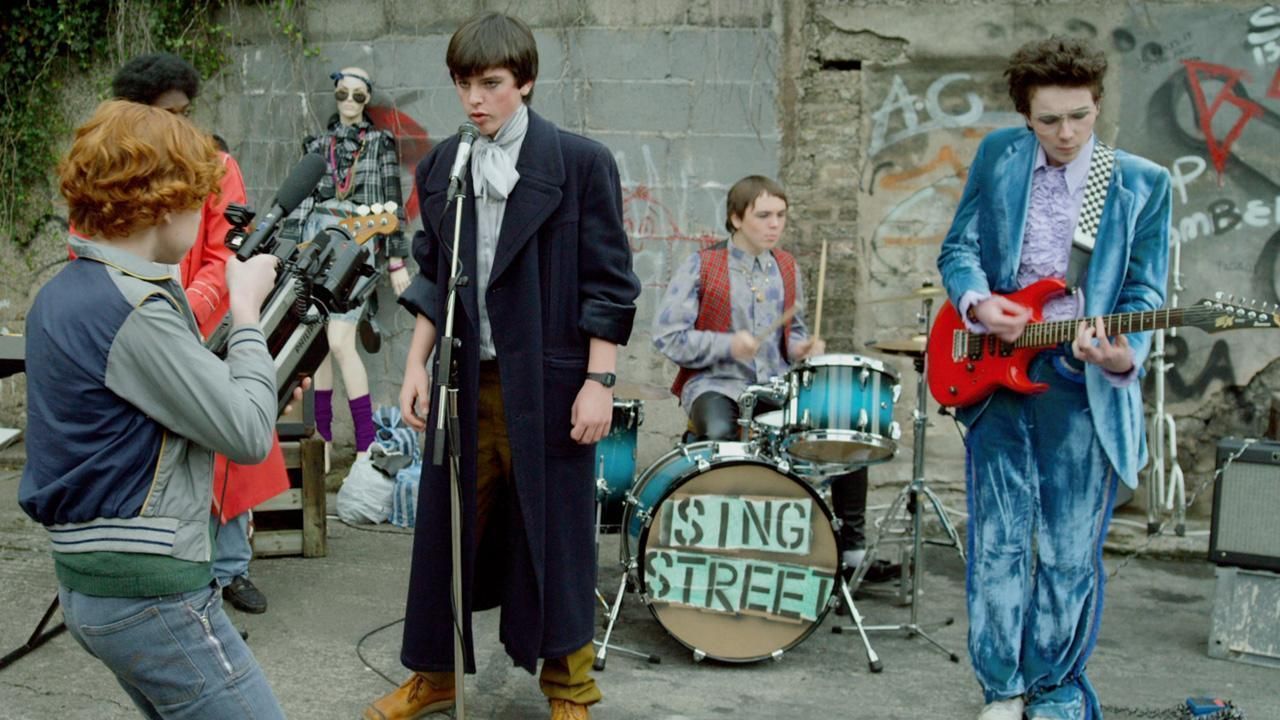Sing Street
Posted on April 21, 2016 at 5:28 pm
A-| Lowest Recommended Age: | Middle School |
| MPAA Rating: | Rated PG-13 for thematic elements including strong language and some bullying behavior, a suggestive image, drug material and teen smoking |
| Profanity: | Strong language |
| Alcohol/ Drugs: | A lot of smoking by adults and teens, some drug use |
| Violence/ Scariness: | Bully, some fights, reference to sexual abuse |
| Diversity Issues: | None |
| Date Released to Theaters: | April 22, 2016 |
| Date Released to DVD: | July 26, 2016 |
| Amazon.com ASIN: | B01E698HZA |
When you’re a teenager, suddenly, nothing you thought you knew seems certain anymore. Your parents do not understand you. Your siblings don’t understand you. Your teachers don’t understand you. You don’t understand yourself — everything outside and inside of you seems to be changing all the time.
Only one thing understands you: the music. For most of us, that means rock music. Somehow, those songs reach us when nothing else can. Improbably, they understand us, they accept us, and they believe in us and in unlimited possibilities for ourselves and the world we can hardly begin to imagine. That’s why the music of your teen years feels visceral in a way no other music can. No matter how much you love music you discover later in life, it is never a part of you like the music that helps you discover yourself.
“Sing Street” is the rare movie that not only recognizes and portrays this experience; it goes farther than that. It is as close to re-creating the experience as it is possible for a movie to be. Watching this movie is not like remembering what it is like to be 14 and have your soul restored through rock and roll. It is like being there, but having it all work out the way better than you could have wished.
Writer/director/lyricist John Carney, who showed a gift for movies about music and musicians with Once and Begin Again, says that this movie is inspired by his own teen years, but about what he wished had happened instead of what did. Like the main character, Conor (enormously appealing newcomer Ferdia Walsh-Peelo), Carney grew up in 1980’s Ireland, in love with the music of the era, and the soundtrack features a sensational selection from The Cure, Depeche Mode, Duran Duran, A-Ha, Spandau Ballet, and The Jam, and dead-on instant classics from Carney and composer Gary Clark. Carney knows that when your feelings get too big for the song, you have to dance. When they get bigger than that, you have to make a music video. And when you desperately want to reach someone who is irresistible but apparently unobtainable, you just have to start a band.
It’s about more than music; it’s about how to respond to the toughest challenges life throws you, adolescence being just one of them. Music in this film performs the same function that the depiction of emotions did for a younger child in Pixar’s “Inside Out.” As Riley did in that film, Conor comes to understand how sadness and happiness need each other. And, after all, there’s no better place to combine them than a rock song.
As the movie opens, Conor is writing song lyrics based on the bitter fight his parents are having on the other side of the wall. They are having financial problems, which means Conor will have to transfer to a less expensive school. And they have run out of patience with one another and are close to splitting up. His new school is much rougher than his old one, both the teachers and the students. Across the street, though, there is a girl. She’s a year older than he is, which in teenage and gender years means that she is infinitely more sophisticated. Her name is Raphina (Lucy Boynton). When she says she is a model, he impulsively invites her to be in his music video (he has just seen Duran Duran’s seminal music video for “Rio”). When she says she might, he realizes that now he has to start a band.
With guidance from his older brother (a terrific Jack Reynor), who gives him albums to listen to and tells him to seize the moment, Conor puts together a band. The combination of the gritty reality of recession-era Dublin and the purity of the kids’ passion for what they are doing is just the right setting for the kinds of emotion that only rock and roll can express.
Parents should know that this movie includes strong language and a racist term, smoking by adults and teenagers, drug use, some bullies and violence, and some sexual references including sexual abuse.
Family discussion: Why did Conor say he was a futurist? How did he respond to being bullied?
If you like this, try: “Once,” “School of Rock,” “The Commitments,” “Billy Elliot,” “Pirate Radio,” “We are the Best,” and the music of the 80’s

